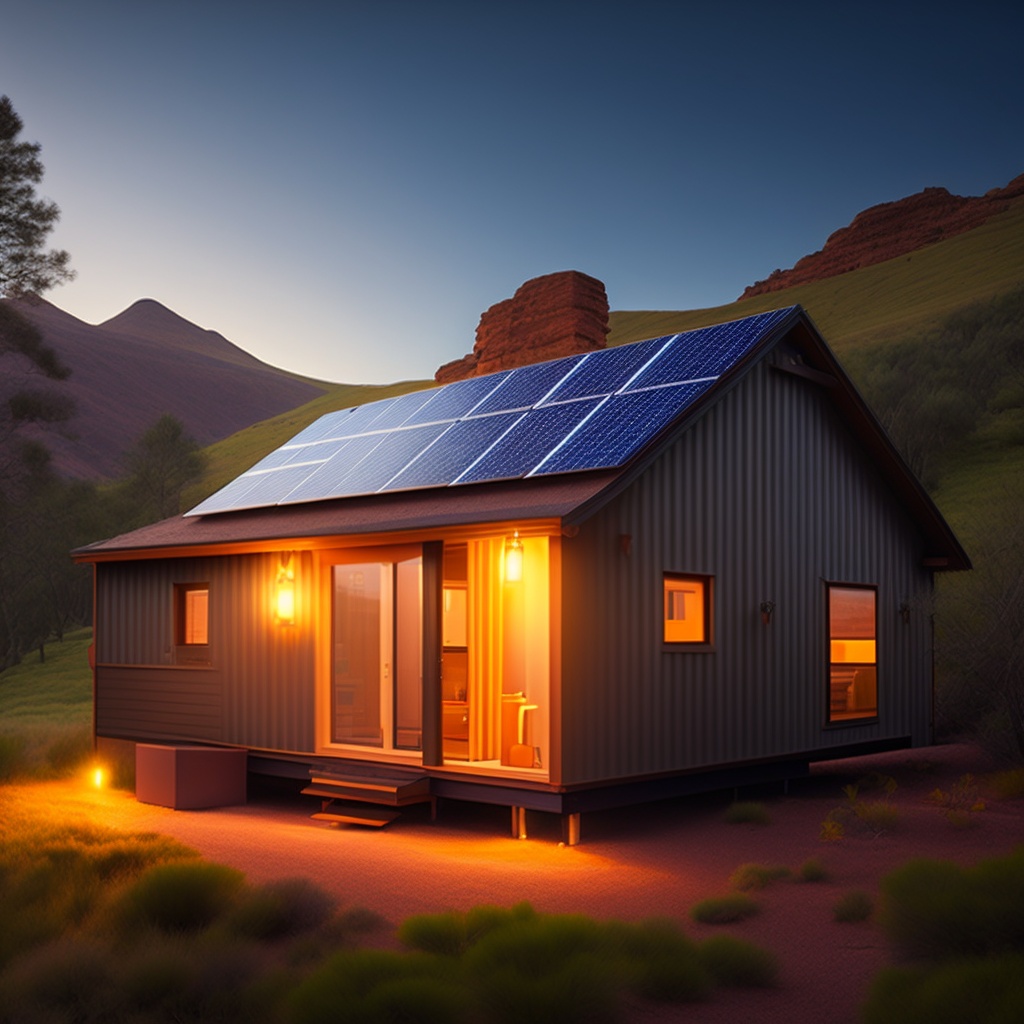Introduction to Off Grid Solar Systems
Picture yourself as an explorer venturing into unchartered territories of energy independence. Welcome to the world of off-grid solar systems! Today, we’re diving deep into the crux of photons, panels, and power. It’s all about self-sustainability and eco-friendly living. Excited? You should be; an off grid solar system could change your life!
What is an Off Grid Solar System?
An off-grid solar system is your ticket to self-sustained living. It’s a standalone power system that enables you to generate and store your own electricity using sunlight. Imagine this:
- A warm sunny day
- Your favorite homemade sandwich
- Unlimited electricity courtesy of the sun without any restrictions
Yes, you heard it right – zero reliance on power grids, and no, you don’t need to be a rocket scientist or tech genius to set it up!
History of Solar Systems for Off Grid Living
Solar energy is not a new concept. The history of solar power traces its roots back to the early civilizations. Our ancestors, although they did not have the sophisticated technology we have today, understood the sun’s immense power and devised ways to harness it.
In the 7th century BC, the Ancient Greeks, and Romans used a simple yet ingenious method to light torches for religious ceremonies. They used sunlight and a piece of glass to ignite the torches. Fast forward to the 3rd century BC, and the famous Greek scientist Archimedes reportedly used a collection of mirrors to focus sunlight and set invading Roman ships on fire. This could be viewed as an early and aggressive form of concentrated solar power!
The industrial revolution in the 18th century saw a significant increase in the consumption of fossil fuels, pushing renewable energy to the back seat. However, the concept of harnessing solar power was revived in the mid-19th century when French scientist Edmond Becquerel discovered the photovoltaic effect.
This discovery led to the development of the first genuine solar cell by Charles Fritts in 1883. Although it had a meager efficiency of 1%, it was a starting point.
Fast forward to the mid-20th century, the space industry brought a significant breakthrough. They started using solar technology to provide power aboard spacecraft. The Vanguard 1 — the first artificial earth satellite powered by solar cells — remains the oldest satellite in orbit, symbolizing the durability and longevity of solar power.
The oil embargo of the 1970s sparked a renewed interest in solar power as the world faced the harsh reality of its over-reliance on fossil fuels. This period saw the birth of the off-grid solar system, a complete system capable of providing electricity to homes detached from the power grid. These systems were large and relatively inefficient by today’s standards. Still, they laid the groundwork for the modern, advanced off-grid solar systems we see today.
Today, off-grid solar systems have become an efficient and viable source of energy for people all around the world. They have evolved to become more powerful, efficient, and affordable. These modern systems can support an entire household, a far cry from their humble beginnings. They embody humanity’s desire for energy independence and sustainability, serving as a testament to our ingenuity and determination.
The journey of solar power, from igniting a torch to powering an entire house, is nothing short of extraordinary. This is a shining example of our perpetual quest for progress, a quest powered by the sun.
Off Grid Solar System: Benefits of Going Off Grid
Living off-grid is a blend of practical and philosophical benefits. There’s an undeniable sense of achievement when you’re powered by the sun.
Energy Independence
With off-grid solar systems, you’re creating your personal power station. Say goodbye to blackouts and price hikes! The sun is dependable, and last I checked, it won’t send you a bill.
Environmental Impact
Solar panels are silent guardians of the environment. They harness power without any harmful greenhouse emissions. You’re not just off-grid; you’re actively contributing to the well-being of our planet.
Cost Savings
While setting up an off-grid solar system might require an initial investment, the system pays for itself over time. No more monthly electric bills, just pure, unadulterated sunlight. Over time, your savings can add up to a small fortune.
How Off Grid Solar Systems Have Evolved Over Time
Solar systems have come a long way since their inception. The bulky, less efficient solar systems of the past have made way for sleek, ultra-efficient modern versions. Advancements in technology like MPPT charge controllers and lithium-ion batteries have supercharged solar systems’ power and storage capabilities. This transformation is like moving from a horse-drawn carriage to a self-driving electric car!
Key Components of an Off Grid Solar System
Let’s take a look at the superheroes of an off-grid solar system.
Solar Panels
These are your very own personal sun catchers. They’re the heart of the system, converting sunlight into usable electricity. The more sunlight they catch, the more power you get.
Battery Storage
Once the sun sets, we don’t return to the dark ages. We have batteries to store excess electricity produced during the day, allowing you to keep the lights on when the sun isn’t shining.
Charge Controller
This unsung hero ensures your batteries don’t overcharge, extending their lifespan. It manages the power flow, making sure everything runs smoothly.
Inverter
The electricity generated by solar panels is in direct current (DC). Our home appliances, however, run on alternating current (AC). The inverter is the key that unlocks the power, converting DC into AC.
Setting Up Your Own Off Grid Solar System
Setting up your own off-grid solar system is like preparing a delectable dish. You need the right ingredients, precise measurements, and careful assembly. So, let’s don our chef hats and dive into the steps of cooking up an off-grid solar system:
Understanding Your Energy Needs
The first step is akin to preparing your grocery list. Determine what appliances and devices you intend to power. It’s essential to understand your daily energy consumption. Calculate the wattage each device uses and how long you use it daily. Sum these up, and you get your daily energy needs.
Choosing the Right Solar Panels
Choosing the right solar panels is like picking the freshest fruits from the market. You want quality and efficiency. The size and number of solar panels you need will depend on your daily energy consumption and the amount of sunlight your location receives. More sunlight means fewer panels are required, and vice versa.
Selecting the Battery Storage
Just like a well-stocked pantry, a solar system needs ample storage. Batteries store the extra energy produced during the day for use when the sun isn’t shining. The size of your battery storage will depend on how much power you need to store.
This is typically calculated based on your energy consumption during the most prolonged period of anticipated no sun (autonomy), such as during extended cloudy or rainy days.
Choosing an Inverter
The inverter is like your trusty kitchen blender, converting the ingredients (or, in this case, electricity) into a usable form. Since your solar panels produce DC power and your appliances use AC power, you’ll need an inverter to convert DC to AC.
Deciding on a Charge Controller
A charge controller is the kitchen timer of your solar system. It prevents overcharging of the batteries by controlling the power that flows into them, much like a timer prevents overcooking by shutting off the oven at the right time.
Installation
Now it’s time to put all the ingredients together. This involves mounting your solar panels in a location where they will get maximum sunlight, installing the batteries, connecting the charge controller and inverter, and wiring everything together. This part can be complex and requires a good understanding of electrical systems. If you’re not comfortable doing this yourself, consider hiring a professional.
Maintenance
Finally, just like regularly cleaning your kitchen, regular maintenance of your off-grid solar system is crucial. This includes cleaning the solar panels, checking the charge controller and inverter for any signs of wear and tear, and monitoring battery health.
Setting up your own off-grid solar system is a journey toward self-sufficiency and sustainable living. With careful planning and execution, you can enjoy the sweet taste of energy independence.
Future Advancements in Off-Grid Solar Systems
The realm of off-grid solar systems is on the verge of transformative advancements that promise to revolutionize energy production, storage, and management. These innovations not only expand the potential of renewable energy but also offer hope for a more sustainable and self-sufficient future.
Highly Efficient Solar Panels
Harnessing the sun’s abundant energy efficiently has long been a goal in solar technology. Current solar panels boast an efficiency rating of around 15-20%, but the future holds the promise of much higher efficiency. Researchers are delving into advanced photovoltaic materials such as perovskites and tandem cells, which could potentially push solar panel efficiency north of 30%. This substantial leap in efficiency would enable the generation of more power from smaller panels, making solar energy even more economically attractive and accessible.
Next-Generation Energy Storage
Energy storage is a linchpin in the effectiveness of off-grid solar systems, and future advancements hold tremendous potential. Lithium-sulfur batteries are emerging as a promising alternative, offering higher energy density and lower costs compared to existing battery technologies. Additionally, solid-state batteries and innovative gravity-based energy storage solutions are on the horizon. These developments promise to provide off-grid systems with superior capacity, durability, and environmental sustainability.
Smart Energy Management Systems
As the world embraces the era of smart homes, off-grid solar systems are poised to integrate seamlessly. Advanced inverters, beyond their role in DC to AC conversion, are evolving into intelligent energy management hubs. These systems will have the ability to predict energy consumption patterns, optimize energy distribution based on priorities, and even anticipate weather conditions to enhance energy production and storage efficiency. The result will be a more autonomous and adaptive off-grid system.
Integration with Other Renewable Energy Sources
The future of off-grid systems lies in their versatility and adaptability. These systems will likely incorporate multiple sources of renewable energy to ensure reliability. For instance, a home may utilize solar power during the day, switch to wind power during windy nights, and store excess energy as potential energy using advanced technologies like flywheels or pumped storage. This multifaceted approach ensures a constant and sustainable energy supply.
Solar Panel Recycling
As the adoption of solar panels continues to surge, the importance of recycling these panels becomes increasingly significant. Solar panel recycling involves the recovery of valuable materials like silicon and silver from old panels. Some companies have already initiated recycling efforts, but the process is expected to become more streamlined and efficient in the future. This commitment to sustainability ensures that the solar industry remains environmentally responsible.
In conclusion, the future of off-grid solar systems holds immense promise and potential. These systems embody our commitment to a more sustainable and self-sufficient future, offering solutions to combat climate change and ensure a reliable and eco-friendly energy supply. With advancements in efficiency, energy storage, smart management, integration with other renewables, and responsible recycling, off-grid solar systems are set to shine even brighter in the years to come.
Common Misconceptions About Off-Grid Solar Systems
As off-grid solar systems become increasingly popular, they also give rise to several myths and misconceptions that can obscure the true potential and benefits of these systems. Let’s debunk these misconceptions and shed light on the reality of off-grid solar technology.
Misconception 1: Off-Grid Solar Systems Can’t Provide Enough Power
One common misconception is the belief that off-grid solar systems cannot generate sufficient power to meet the demands of a typical household. In reality, with careful planning and system sizing tailored to specific energy needs, off-grid solar systems can power all household appliances, including energy-intensive ones like air conditioners and heaters. Advanced battery storage and energy management technology ensure a reliable and continuous power supply.
Misconception 2: They Are Too Expensive
The upfront cost of installing an off-grid solar system can appear substantial, which leads to the misconception that they are prohibitively expensive. However, it’s essential to view this expense as an investment rather than a mere cost. Over time, off-grid solar systems offer substantial savings on electricity bills, especially in areas with rising energy prices. Additionally, various financial incentives, rebates, and tax breaks are available to make these systems more affordable and economically viable.
Misconception 3: Solar Panels Don’t Work in Cold, Cloudy Climates
Another misconception surrounds the belief that solar panels cease to function effectively in cold or cloudy climates. While it’s true that solar panels perform optimally in direct sunlight, they continue to generate electricity even in less-than-ideal conditions. In fact, solar panels can be more efficient in colder temperatures, and modern panels can harness energy from diffused sunlight on cloudy days, albeit at a reduced efficiency. This versatility makes off-grid solar systems viable in a wide range of climates.
Misconception 4: Solar Systems Require a Lot of Maintenance
Some individuals believe that solar systems are high-maintenance due to misconceptions about their complexity. In reality, solar systems are incredibly low maintenance because they lack moving parts. Routine cleaning to remove dust or debris and occasional system check-ups to ensure all components are functioning correctly are typically all that’s needed to keep an off-grid solar system operating at its best. These minimal maintenance requirements contribute to the long-term cost-effectiveness of the system.
Misconception 5: Off-Grid Living Means Sacrificing Comfort
One prevalent misconception equates off-grid living with a rustic, back-to-basics lifestyle, implying that modern comforts must be sacrificed. However, going off-grid does not necessitate giving up these comforts. In fact, modern off-grid solar systems are designed to support a comfortable and convenient lifestyle. They can power all the amenities of a contemporary household, from lighting and heating to appliances and entertainment systems. Off-grid living can offer the best of both worlds: sustainability and comfort, without the need to compromise on modern conveniences.
In summary, understanding the realities of off-grid solar systems dispels these common misconceptions. These systems have the potential to provide ample power, offer long-term savings, perform well in various climates, require minimal maintenance, and allow for a comfortable and modern lifestyle. As technology advances and awareness grows, off-grid solar systems are becoming an increasingly viable and attractive option for sustainable living.
Off Grid Solar System: Conclusion
Embracing an off-grid solar system is more than just an eco-friendly decision. It’s a commitment to sustainable living, a step towards self-reliance, and a contribution to a healthier planet.
The process might seem intimidating initially, given the investment involved and the numerous components to understand. But remember, every bold journey begins with a single step, and setting up your own off-grid solar system is a journey worth taking.
As we look to the future, the prospect of harnessing solar power becomes even more exciting. With advancements on the horizon, off-grid solar systems are set to become even more efficient, reliable, and accessible.
So, are you ready to embark on this illuminating journey? Are you prepared to bask in the golden glow of energy independence and sustainability? If your answer is a resounding yes, welcome to the vibrant, sun-powered world of off grid living. Your future self, and indeed the future of our planet, will thank you for it.
Frequently Asked Questions
What does an off-grid solar system cost?
The cost of an off-grid solar system varies based on your energy needs, the type of equipment, and installation charges. Typically, you might spend between $15,000 to $50,000 for a complete setup. But remember, this is a long-term investment.
Can an off-grid solar system power a house?
Definitely! An off-grid solar system can power a house, and not just a tiny one! With the correct setup, you can power all your appliances and electronics.
What happens during cloudy days or at night?
Solar panels need sunlight to generate power, but that doesn’t mean you’re left powerless on cloudy days or at night. The battery storage system stores excess energy for use during these times.
How long do solar panels and batteries last?
Solar panels are resilient. Most manufacturers guarantee their performance for 25 years or more. Batteries, however, have a shorter lifespan. They usually need replacement every 5 to 15 years.





Pingback: How Do Solar Panels Work: A Guide for Curious Minds - Eco Life Wise
Pingback: Solar Water Pump: Sustainable Water Solutions - Eco Life Wise
Pingback: What Is Sustainability? Unlocking the Power to Transform Our World
Pingback: Most Efficient Solar Panels: A Comprehensive Guide
Pingback: Solar Panel Kits: Embrace the Convenience of Solar Power
Pingback: Navigating the World of Sustainable Clothing Brands
Pingback: Compostable Trash Bags: The Eco Friendly Choice
Pingback: Building Off the Grid: A Guide to a Self-Sustained Lifestyle
Pingback: The Solar Battery: Ensuring A Future of Sustainable Energy
Pingback: Organic Basics: The Untamed Journey of Green Living
Pingback: Zero Waste Products: Easy Steps to Reduce Your Waste | Eco Life Wise
Pingback: Climate Change: The Facts That Will Make Your Jaw Drop! | Eco Life Wise
Pingback: Energy Efficient Homes: Your Ultimate Guide to Greener Living | Eco Life Wise
Pingback: How to Extend Your Swimming Season With a Solar Pool Heater
Pingback: Slow Fashion: Strides Toward an Eco Friendly Future
Pingback: Deforestation and Climate Change: The Surprising Link
Pingback: Unlock Sustainability Goals: Ditch Non-Renewable Polymers for Eco-Alternatives | Eco Life Wise
Pingback: Charge Your Electric Car With Solar Panels: The Ultimate Guide to Green Energy! | Eco Life Wise
Pingback: Are Bioplastics Better Than Traditional Plastics? 6 Factors You May Not Know | Eco Life Wise
Pingback: Self Sustainable Homes: 7 Practical Reasons Why You Need One Today! | Eco Life Wise
Pingback: Solar Energy Pros and Cons: 8 Considerations | Eco Life Wise
Pingback: How Do Solar Panels Work? New Solar Panels 101 | Eco Life Wise
Pingback: Commercial Solar Panels: Exploring the Lifespan | Eco Life Wise
Pingback: What Is A Carbon Footprint? | Eco Life Wise
Pingback: Safely Recycling Lithium Batteries: 13 Things You Should Know | Eco Life Wise
Pingback: Renewable Energy Sources: 10 Ways They Help Reduce Greenhouse Emissions | Eco Life Wise
Pingback: Composting Outdoor Gatherings: 19 Eco-Friendly Waste Management Tips | Eco Life Wise
Pingback: Off Grid Air Conditioner: A Green Solution to Beat the Heat
Pingback: Advantages of Renewable Energy: 13 Helpful Ways to Embrace a Cleaner Future | Eco Life Wise
Pingback: How Do Wind Turbines Generate Electricity? 4 Ways That May Surprise You | Eco Life Wise
Pingback: Why Are Solar Panels Considered A Green Energy Source? | Eco Life Wise
Pingback: Mushroom Compost: Care for Some Black Gold? | Eco Life Wise
Pingback: Building Off the Grid: A Guide to a Self-Sustained Lifestyle
Pingback: Victron Energy BlueSolar MPPT 100V 30 amp 12/24-Volt Solar Charge Controller Review | Eco Life Wise
Pingback: Allto Solar Remote Meter Review | Eco Life Wise
Pingback: Victron Energy SmartSolar MPPT Tr 250V 60 Amp Solar Charge Controller Review | Eco Life Wise
Pingback: V-dog Treat Bundle Review: 10 Things You Should Know | Eco Life Wise
Pingback: Ring Stick Up Cam Pro Solar Review | Eco Life Wise
Pingback: Vegan Forums | Eco Life Wise
Pingback: Vegan Meme | Eco Life Wise
Pingback: Victron Energy BlueSolar MPPT 75V 15 Amp 12/24-Volt Solar Charge Controller Review | Eco Life Wise